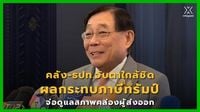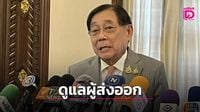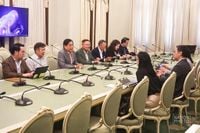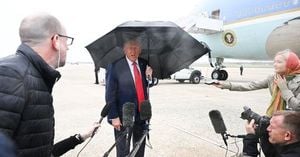On April 16, 2025, Mr. Phichai Chunhawachirong, the Deputy Prime Minister and Minister of Finance of Thailand, held a significant meeting with Mr. Setthaput Suthiwartnarueput, the Governor of the Bank of Thailand (BOT), to discuss the potential ramifications of recent tariff increases imposed by the United States. This meeting, which took place at Government House, aimed to address the economic challenges facing Thailand as a result of these new trade policies.
During the discussion, Mr. Phichai emphasized the need for a coordinated response to the 36% import tariff introduced by the U.S. He noted that the impact of such tariffs would not only affect Thailand's exports to the United States but could also have broader implications for trade with other partner countries. "We are currently assessing various scenarios to understand how these changes will affect our economy, especially since we are an export-driven nation," he stated.
Mr. Phichai pointed out that the implications of the U.S. tariff policy extend beyond direct trade issues, affecting financial markets, including the money market, stock market, and bond market. He remarked, "The situation is complex, and we need to be prepared for various outcomes. The economic landscape is shifting, and we must adapt accordingly." This sentiment highlights the uncertainty surrounding global trade dynamics and the necessity for Thailand to remain agile in its economic strategies.
In light of these challenges, the Ministry of Finance and the BOT have committed to working closely together to develop measures that will support exporters facing liquidity issues due to the slowdown in orders. Mr. Phichai noted, "We anticipate that the slowdown in export orders will impact cash flow and liquidity for many businesses, which is why we need to have contingency plans in place." He emphasized the importance of collaboration between governmental bodies to ensure a robust response to these economic pressures.
Furthermore, the discussion revealed that the BOT is closely monitoring currency fluctuations and their potential impact on Thailand's trade. Mr. Phichai highlighted that the BOT is preparing for various scenarios regarding currency exchange rates, considering both the possibility of increased exports and the challenges posed by fluctuating markets. "We need to ensure that our currency policies are flexible enough to respond to these changes in the global economy," he explained.
As part of their ongoing efforts, Mr. Phichai and Mr. Setthaput agreed to enhance their communication and data exchange to better anticipate and respond to new developments in the economic landscape. This proactive approach is crucial as they navigate the uncertainties introduced by the U.S. tariffs.
In response to questions about Thailand's economic liquidity, Mr. Phichai reassured stakeholders that the country has sufficient liquidity to weather the current challenges. However, he acknowledged that the economic environment is fluid and that continuous monitoring is essential. "We have discussed this extensively, and I can confirm that Thailand's liquidity remains adequate for now," he stated.
While the meeting primarily focused on immediate economic concerns, it also touched upon broader issues related to interest rate policies. Mr. Phichai clarified that discussions regarding interest rates would be handled by the Monetary Policy Committee (MPC) of the BOT, which is set to meet the following week. He expressed confidence that the MPC would take into account the evolving economic conditions in their deliberations.
Looking ahead, Mr. Phichai mentioned plans to visit the United States to engage in further discussions regarding trade relations. He indicated that this visit would involve consultations with various stakeholders to address non-tariff barriers that could hinder trade. "We are preparing to address these non-tariff issues, which are just as critical as tariff-related discussions," he noted.
In conclusion, the meeting between Mr. Phichai and Mr. Setthaput underscores the urgent need for Thailand to adapt to the changing global trade environment. With the U.S. tariffs posing significant challenges, the Thai government is committed to developing strategies that will safeguard the interests of exporters and maintain economic stability. As they move forward, the collaboration between the Ministry of Finance and the Bank of Thailand will be key in navigating these turbulent waters.






